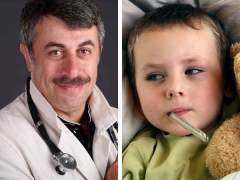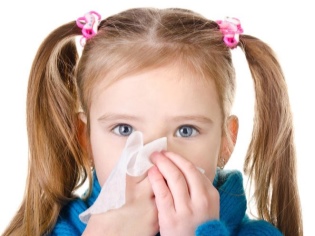Dr. Komarovsky about enterovirus infection in children
Enterovirus infection. The name is one, and the diseases that can be attributed to this type - a great many. About what it is, how it is transmitted and what to do if the pediatrician makes the child the appropriate diagnosis, says a famous doctor, author of books and articles on children's health, Yevgeny Komarovsky.
What it is?
Enterovirus infection is a disease that is caused by viruses that enter the body through the gastrointestinal tract. In the people, the disease is called “dirty hands disease”, although the spectrum of action of enteroviruses is quite wide. Pathogens include:
- enteroviruses - 4 types;
- poliomyelitis viruses - 3 types;
- echoviruses - type 31;
- Coxsackie viruses (A and B) - about 30 types.
All these viruses are very resistant to acidic environment, so they easily manage to survive under the attack of gastric juice and get into the intestine, where they begin to show their pathogenic activity. In addition, these viruses can exist at normal room temperature for several days.
Symptoms
Recognizing an enterovirus infection is not as easy as it sounds. About 90% of polio infections are covert, almost half of the remaining enteroviruses also do not give any specific symptoms. Only some pathogens are capable of giving a definite clinical picture, which makes it possible to suspect an enterovirus infection in a child:
- fever, fever;
- respiratory manifestations - runny nose, cough, sore throat;
- abdominal pain, diarrhea. This symptom is rare.
Enteroviruses usually cause diseases that doctors conditionally divide into potentially severe and less dangerous ones. The first are encephalitis and serous meningitis, myocarditis and hepatitis. Less dangerous are fever with or without a rash, herpangina, conjunctivitis, pharyngitis, gastroenteritis, three-day fever.
Diagnosis, due to the blurring of symptoms, is difficult. A doctor whom parents will call home can only make a presumptive diagnosis, but just answering the question of whether the child has an enterovirus infection and which virus has infected it will only help laboratory research:
- serological blood test;
- virological examination of blood and feces;
- molecular biological method for isolating enteroviruses from a laboratory sample.
Therefore, if the child has nothing but increased fever, feeling of aching muscles and a small rhinitis, the pediatrician will be right, assuming that the baby has an enterovirus infection.
Ways of Transmission
Enteroviruses enter the body most often through the mouth - with dirty hands, water, food. From a sick person, a child may well become infected by airborne droplets. Most often outbreaks of infection occur in the summer and early fall. In cities and countries with hot climates, outbreaks and even epidemics are observed more often than in northern latitudes.
From here follows a rather wide geographic distribution of enteroviruses in resort towns, on popular crowded sea coasts. In 2017, the Coxsackie virus raged in Turkey, and in the 2000m, the ECHO virus struck hundreds of people in Singapore, Taiwan. From time to time small foci are recorded on the Black Sea coast in Russia. However, this does not mean that there are no such viruses far from the sea and the sun. They are ubiquitous.
Treatment
Yevgeny Komarovsky claims to call enteroviral intestinal infection, not quite right. That is, it is essentially intestinal, but has a strictly viral origin. While the intestinal infection, in the broad sense of the word, can be caused by both toxins and bacteria.
It follows that enterovirus diseases should be treated according to all the rules for the treatment of viral infections. This means that antibiotics are contraindicated because they do not have the slightest effect on viral particles. At the same time, they increase the risks of secondary complications, including that of the central nervous system.
Reception of antiviral drugs, which are very likely to appoint all the same called a pediatrician, according to Yevgeny Komarovsky, does not make much sense. After all, there are extremely few antiviral drugs with proven clinical efficacy in Russia. All of them belong to the category of "heavy and serious" drugs that are used intravenously in infectious hospitals. Tablets, sold in any pharmacy without a prescription and positioned as an "effective remedy for viruses", do not have any relation to such serious and truly effective means.
There are special drugs against enteroviruses - this virus cannot be defeated by universal antiviral pills. Quite often, doctors recommend products that belong to the groups of interferons and immunoglobulins.
However, many physicians are cunning, saying that the pills will definitely help the child. Most doctors know that immunoglobulins show relative clinical efficacy only with intravenous infusion and only in certain groups of patients in newborns and in people with HIV infection.
For all other pills and drops containing immunoglobulin, prescribed on the basis of the principle "something must be done." The child drinks an almost harmless remedy, his parents treat him, the doctor’s conscience is calm, because he knows perfectly well that in 3-6 days the uncomplicated enterovirus infection will pass by itself, without any pills at all.
For all these reasons, Komarovsky recommends that parents whose child has an enterovirus infection, simply create the right conditions for him to help him recover quickly. The sooner the immunity cope with the "invader", the sooner the child will recover. Truly effective remedial measures should be:
- the microclimate in the room should be favorable - air temperature from 18 to 20 degrees, regardless of the season, and the relative humidity of air - 50-70%;
- heavy drinking with body temperature - under such conditions, the liquid is absorbed faster;
- saline washing of the nose and nasopharynx in the presence of respiratory symptoms (runny nose, cough) - every half hour, if the child is not sleeping;
- careful ventilation of the roomfrequent wet cleaning;
- in the absence of fever - walks in the fresh air.
Prevention
Specific prevention of enteroviruses does not exist. There is not a single medicine that can reduce the risk of infection, although some sources point out as a prophylactic antiviral drugs interferon groups. This statement, in terms of evidence-based medicine, has no real evidence, says Yevgeny Komarovsky.
Vaccination against enteroviruses as such has not been developed, with the exception of the vaccine against polio and hepatitis. But the varieties of viruses are more like the diseases they cause. After the disease, immunity to most enteroviruses is produced resistant, it lasts for several years.
In the next video, Dr. Evgeniy Komarovsky tells about enterovirus infection in children.





















